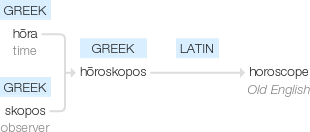Horoscope
Old English: via Latin from Greek hōroskopos, from hōra ‘time’ + skopos ‘observer’.
wiktionary
Borrowed from Middle French horoscope, from Medieval Latin horoscopus, from Ancient Greek ὡροσκόπος(hōroskópos), from ὥρα(hṓra, “any limited time”) + σκοπός(skopós, “watcher”).
etymonline
horoscope (n.)
"observation or diagram of the heavens, showing the positions of planets, on any given day, used by astrologers," mid-16c., from French horoscope, from Latin horoscopum/horoscopus, from Greek hōroskopos "nativity, horoscope," also "one who casts a horoscope, one who observes the hour of a birth," from hōra "hour; season; period of time" (see hour) + skopos "watcher; what is watched" (from PIE root *spek- "to observe").
The notion is of "observing the hour" (of someone's birth, etc.). The word was in late Old English and Middle English as horoscopum, from Latin, but the modern form is considered to be a reborrowing. Old English glossed Latin horoscopus with tidsceawere ("time-shower"). Related: Horoscopic; horiscopal. Horoscopy "the casting of a nativity" is attested from 1650s, from Latin horoscopium, from Greek hōroskopeion, from hōroskopia.
